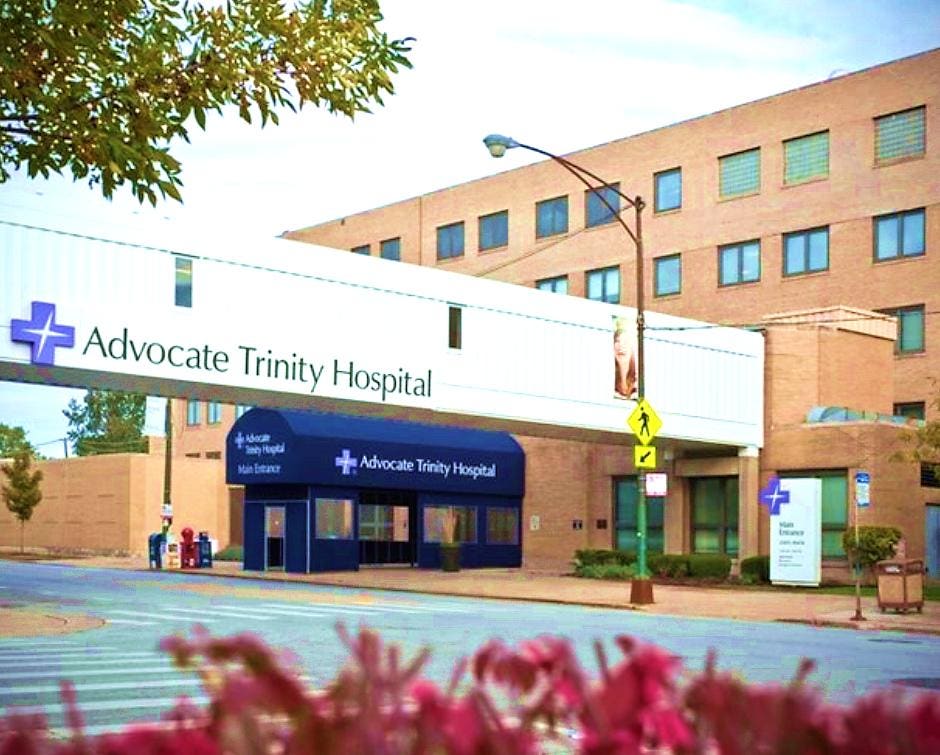- Ontario Teachers’ Joins Goldman Sachs in Strategic Investment in Healthcare Tech Giant Omega
- Over 30% of South Koreans invest in crypto assets
- What Makes General Motors Company (GM) an Attractive Investment?
- Japanese firm SoftBank plans to invest $100 billion in U.S., Trump announces
- Apple’s AI Investments Bring It to Edge of $4 Trillion Valuation
Advocate Trinity Hospital on Chicago’s South Side will be replaced by a new facility as part of a $1 … [+]
You are viewing: How A Chicago Health System’s $1 Billion Investment Advances Equity
A Chicago area healthcare system is spending $1 billion to re-invent healthcare on the city’s South Side in neighborhoods where there’s a 30-year life-expectancy gap when compared to the more affluent North Side.
Advocate Health Care’s investment will include $300 million in land purchases and related spending to build a new hospital that will replace a facility that is more than a century old. And another more than $500 million will be allocated to expand outpatient care executives say will be “embedded in the community.” Another more than $200 million will be invested in hospital and outpatient programs and services designed in part to address social determinants of health such as expanding access to healthy foods, housing, transportation and prescription drugs.
It’s one of the largest community-focused healthcare investments in the nation, industry analysts and those involved say, and comes at a time providers of medical care are investing in an array of services from food and nutrition to housing to make sure patients are getting the right care in the right place and at the right time. Health insurers, too, are increasingly paying to address social determinants of health beyond hospitalizations, physician services, prescription drugs and medical devices.
“We are so far ahead of where we were 50 years ago technologically and in terms of the potential to decentralized care that I think the timing of this new effort is good as long as the principles do not get overly enamored with gigantic facilities,” said Jim Unland, president of Health Capital Group and editor of the Journal of Health Care Finance.
In Advocate’s case, executives say they aren’t focused on big facilities but investing in a “wellness model” that executives involved say included several months of meetings with community leaders and South Side residents throughout 2024.
See more : Phase 2 data will drive biopharma VC investment in 2025: PitchBook
Far more will be spent on outpatient care and related programs than a replacement hospital for the aging Advocate Trinity Hospital building that is 115 years old. As one example, 10 new “Advocate Health Care Neighborhood Care” locations will be created to “serve the whole family” including the first one in the next year at the South Side YMCA.
“We have built a model that gets at the heart of chronic disease and wellness through much help South Side residents live their healthiest lives,” Michelle Blakely, president of Advocate Trinity Hospital said when the project was announced this month. “We need to provide the community with the necessary resources to stay well – where we live, work, play and worship – and that takes a comprehensive plan.”
Advocate Health Care is a part of the large multi-state Advocate Health, which is based in Charlotte, N.C. and was formed in 2022 as the result of the mega-merger of with Advocate Aurora Health and Atrium Health. Advocate Health Care remains the largest medical care provider in the Chicago area and Illinois with more than 250 sites of care that includes 11 hospitals.
“The health disparity gap the South Side communities face keeps me up at night,” said Dia Nichols, president of Advocate Health Care, who oversees operations in Illinois. “I am passionate about everyone getting the care they need – equitable care.”
Advocate Health Care has an agreement to purchase 23 acres of land on the South Side of Chicago near Lake Michigan where it plans to build a 52-bed hospital with 26 medical surgical beds, a four-bed dialysis unit and an emergency room with 16 bays, executives said. “This will enable Advocate to expand services and beds if community need warrants, but currently there is an excess of hospital beds on the South Side,” Advocate Health Care said in a statement, citing data from the Illinois Department of Public Health showing fewer than half of hospital beds on Chicago’s South Side are being used.
“For over 30 years, this vacant site has stood as a symbol of disinvestment and missed opportunities that have deeply impacted the entire Southeast Side,” Chicago alderman Greg Mitchell, who represents the area, said of the $300 million in spending on the former U.S. Steel South Works site near the lakefront.
The development process included more than 20 listening sessions and engaged hundreds of South Side residents, executives and community leaders said. “This visionary initiative, rooted in the voices and ideas of South Side residents, takes direct aim at the systemic inequities that have persisted for generations,” Chicago Mayor Brandon Johnson said.
Chicago’s South Side has been hit hard by the loss of medical care providers. In particular, more than 20 hospitals have closed since 2000 in the Chicago area and most have been on the South Side, according to a 2022 report in Chicago Policy Review.
See more : SoftBank’s $100bn US Investment Could Change The US Tech Landscape, Here’s How
The loss of medical care providers has led to disparities with “four times as many diabetes related deaths on the South Side than the North Side,” Advocate said in announcing its investment. More than 84% of hospitalized South Side residents also have one mor more chronic conditions including hypertension, diabetes, congestive heart failure, mental health needs, substance use issues and renal failure, Advocate executives said.
To be sure, there are notable differences in not only the quality of the care received between Chicago’s North and South sides that have been well documented by national studies and health experts but the number of healthcare professionals and physicians willing to practice on the low-income South Side.
Last year, for example, a 31-page report by the American Medical Association and Chicago’s Sinai Urban Health Institute showed closures of OB-GYN facilities have created a “number of disparities” for maternal and infant health on Chicago’s South and West sides. The report was supported by the March of Dimes.
“The health of medically disenfranchised patients and the health of their babies suffer when pregnant patients don’t have access to care in their communities,” AMA President-elect Bobby Mukkamala, M.D. said when the report was released. “With closures of health care facilities compelling patients to travel for necessary care, patients experience worse health outcomes.”
Meanwhile, the lack of full-service obstetrics care in these areas makes it difficult to recruit medical care providers and physicians in particular that is unlikely to improve anytime soon.
“Accompanying ramifications include a decrease in recruiting new physicians into particular specialties such as emergency medicine, family medicine and obstetrics in these communities,” Mukkamala said. “This has created a cycle of disjointed, disconnected care for patients in these neighborhoods, a higher level of burnout for physicians and physicians leaving the profession altogether.”
But the Advocate effort has been hailed by elected officials across party lines and localities in a city and state known for its rough and tumble politics.
“The monumental investment Advocate Health Care is making on the South Side of Chicago will expand access to world-class health care and represents a critical step towards advancing equity – serving as a powerful reminder of what’s possible when we prioritize the health and well-being of our communities,” said Illinois Governor JB Pritzker. “In addition to expanding access to state-of-the-art health care facilities, this investment will also expand workforce opportunities in the region.”
Source: https://magnacumlaude.store
Category: News

